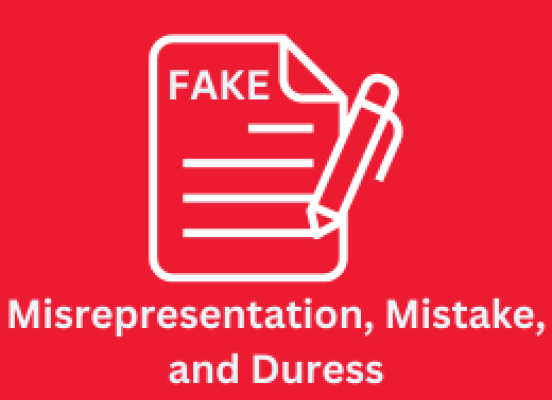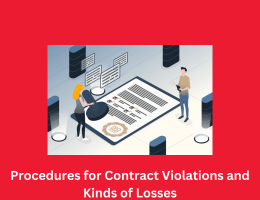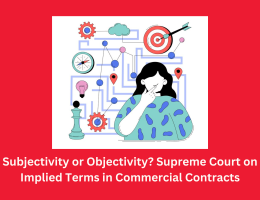
Misrepresentation, Mistake, and Duress: Examining Their Impact on Contract Validity
- By admin --
- Thursday, 07 Mar, 2024
Introduction:
The concepts of deception, mistakes, and duress play a important position in structuring the enforceability and legitimacy of industrial agreements within the problematic discipline of agreement law. The essential guideline of those theories is that agreements have to only be made when all parties have provided their unfastened and knowledgeable permission. However, errors, fraud, or coercion that undermines this consent can also make a agreement voidable, supplying a criminal defense to shield the party who changed into damaged. Here, we have a look at the outcomes that fraud, mistakes, and coercion have on the validity of contracts and display how those factors could render an settlement unenforceable in a regulatory court docket.
Misrepresentation:
When one celebration gives a deceptive impression of a scenario or a legal remember to influence the other to sign a contract, that is known as misrepresentation. Depending at the know-how and intents of the character making the fake declaration, the deception can be harmless, careless, or fraudulent in person. A fake statement made with no goal of deceptive is referred to as harmless misrepresentation, however a fake statement made by a person who does not take reasonable steps to assure its correctness is referred to as negligent misrepresentation. On the other hand, fraudulent misrepresentation includes a practical and intentional lie performed with the goal to lie to and obtain an unfair benefit.
A misrepresentation's effect on a agreement's validity is contingent upon its materiality and diploma of reliance. The harmless celebration might also select to have the settlement declared voidable if the misrepresentation is critical, which means that it should had been of such significance that it led the opposite birthday party to go into into the contract, and the innocent birthday party is based at the deception to their detriment. Contracts which can be voidable because of deception give the harmless birthday celebration the proper to withdraw from the agreement and pursue compensation for any losses they may have incurred because of the deception.
Mistake:
Erroneous beliefs held by way of one or both parties on the time of contracting are noted be mistakes because they compromise the mutual assent essential for a legally binding agreement. One can classify errors into 3 classes: identity, unilateral, and mutual. When events misunderstand a fundamental reality this is pertinent to the subject remember of the contract, this is referred to as mutual error and makes the settlement voidable. A unilateral mistakes is a mistake committed by using just one celebration, and it usually does not make the agreement voidable except the other birthday celebration knew approximately it and exploited it. Erroneous identity happens whilst one birthday party signs and symptoms a agreement questioning they recognise the other birthday celebration's identification, that could make the agreement unenforceable.
The relevance and materiality of an mistakes to the settlement determines the way it impacts the legality of the agreement. The agreement may be declared voidable at the fallacious celebration's discretion if the mistake is extreme and influences a key issue of the agreement, including the events' identities or the nature of the contractual responsibilities. Contracts which can be voidable due to blunders deliver the party that made the error the possibility to withdraw from the agreement and pursue compensation for any losses they'll have incurred.
Duress:
When coercion, threats, or undue have an impact on are used to force a party to sign a settlement in opposition to their will, this is referred to as duress. A style of procedures can be used to result in duress, such as bodily threats, economic coercion, mental blackmail, or misuse of electricity. Since the compelled birthday party is denied the potential to freely negotiate or decline to interact right into a agreement, the fundamental detail of duress is the absence of voluntary consent.
Since contracts made underneath coercion are deemed voidable on the coerced birthday celebration's discretion, duress has a sizable effect at the legality of contracts. Contracts which can be voidable due to duress give the compelled party the proper to withdraw from the settlement and pursue damages for any losses they may have incurred. Furthermore, relying on the specifics of the case, duress may supply upward push to potential claims for damages or other forms of comfort.
Conclusion:
In end, deception, mistakes, and duress are essential thoughts in settlement regulation that manipulate the validity and enforcement of business agreements. In addition, contracts might also emerge as voidable for fraud, errors, or coercion that undermines the parties' free will, providing a felony defense for the aggrieved party's pastimes. Recognizing the results of deception, mistakes, and duress on contract validity lets in parties to create contractual partnerships with readability and confidence, ensuring compliance with criminal responsibilities and protective towards unfair or coercive behaviors. A entire understanding of those principles is critical for all crook justice specialists in addition to each person hoping to make extensive and legally enforceable agreements, on the grounds that contracts remain the inspiration of many aspects of personal and expert relationships.





